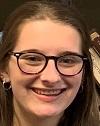Conducting research is a central part of studying history. Research experience makes our graduates attractive job candidates and helps them with admission to graduate programs in history and other fields. The History Department offers a variety of research opportunities, including assignments in our classes, paid research assistant positions, internships, and as part of student/faculty research grants.
For more information about research opportunities and policies, visit our Advising Resources page.
Highlights on History Department Student Researchers
History and American Studies Majors at Saint Anselm are able to participate in a variety of research opportunities. These are offered as assignments in the classroom, paid research assistant positions, as part of student/faculty research grants, and more.

Sarah has undertaken an number of research projects while at Saint Anselm College, both in and outside the classroom. As a part of her Women’s History course, taught by Professor Salerno, Sarah looked into the life of Mrs. Lois Warren Shaw, one of 400 militant suffragists mentioned in the National Women’s Party newspaper The Suffragist.
During this experience, Sarah came face-to-face with some of the difficulties that researchers encounter while tackling their work. For example, when attempting to use genealogical information, she found that her suffragist shared the same name with her daughter which made it difficult to attribute various deeds to the correct person.
Sarah’s biographical sketches and research notes on this topic have been published in the Women and Social Movements database, to which hundreds of academic libraries subscribe. Sarah has also presented her research on this topic at the New England Historical Association Conference in 2016.
“I agreed to present my research experience because I was eager to share with other students and educators the lessons that the project taught me. The NEHA Conference seemed like the perfect place to network and share my experience as a historian with like-minded history students and professors.”
She observed, “Presenting in a conference setting forced me to focus not just on paring down my ideas, but also expressions. I also learned that if you are enthusiastic and knowledgeable about the information you are going to present, those two factors make presenting much less nerve-racking – but it’s okay to be a little nervous too!”
Speaking at the conference helped Sarah realize that historians do much more than just researching and writing—sharing the information they discover in many ways is just as important.
In addition, Sarah has held a position at the New Hampshire Institute of Politics on campus for several years and has contributed to a number of museum-type exhibits including one on John F. Kennedy’s presidential campaign another on “Perspectives of Equality” in the American political system.
Caitlin has participated in several research projects during her time at Saint Anselm College. For example, while serving as student assistant to the history department, she worked on captioning the pictures that adorn the walls of the college's own Coffee Shop so that students and visitors alike would know who or what they were looking at. This project was finished in the fall of 2018.
Using resources including simple Google searches, the older college catalogs (some digitized, others in physical form at Giesel Library), the College archives, information derived from Saint Anselm monks, and articles from the college magazine Portraits, Caitlin was able to date many of the pictures found at the Coffee Shop. This process was not without difficulties, however; some photos, such as those of landscapes, contained no information about what they represented or when they were taken. Without identifying characteristics, many pictures could not be precisely dated.
"...being able to dive deeper and really know how we were founded, what student life used to be like, and see all the changes that happened on campus over the past 129 years, made me feel so much more connected to Saint Anselm College than I would have been without doing this project."

Katherine has contributed to many research-related projects, both within and without the discipline of history, and both in and outside Saint Anselm classrooms. After excelling in a statistics course, she was invited to apply for the New Hampshire INBRE (IDeA Network of Biomedical Research Excellence) grant, which funds student research projects surrounding biomedical topics during both the summer and school year. After being accepted, she became a part of a team consisting of two professors and four students, conducting a statistical analysis of data collected on postpartum depression. Katherine's work attempted to find a link between experiences of postpartum depression and subsequent breast feeding intensity or frequency.
This project involved transferring data collected from women into a computer statistical analysis program, filing and labeling it, categorizing it, and giving values for each variable. Katherine also conducted descriptive statistics (mean, median, frequency), created graphs (histograms, pie charts), and conducted advanced analysis (Analysis of Variance, Repeated Measures Analysis of Variance). Her team's research was presented at the NH-INBRE conference in August, 2018, about which she said, "Overall, this conference was a wonderful experience that helped me learn a lot about my own research and expanded my knowledge of many other areas of scientific research... I got to present at an open poster session, which gave me the opportunity to have one-on-one conversations with people about my research and how it’s significant."
While holding a paid research position, Katherine assisted Professor Andrew Moore in finding sources that concerned the post-presidential career of Jimmy Carter. These materials will help Professor Moore in his task of writing a biography of Carter. Katherine made use of TIME, the New York Times, press releases from the Carter Center, and book reviews of Carter's own published works.
"I’ve learned a lot about how research is conducted through this project... This research is a lot more independent... and I’ve learned the importance of self-motivation in research. Ultimately what keeps me going is my love of research and my interest in Jimmy Carter. It’s so fun to use a jumble of documents to create a clear picture of the past..."

William has participated in a number of research projects at the College. He has done research as part of a paid position for Professor Moore, being tasked with finding primary sources related to the legal and cultural history of guns in America. This work facilitated the creation of an introductory-level history course that Professor Moore first taught in the fall of 2019. Using college databases and the bibliographies of secondary sources, he was able to unearth a great number and variety of primary sources including newspapers, old hunting and fishing magazines like Arms and the Man and Field and Stream, Supreme Court opinions, National Rifle Association advertisements, and local and state statutes.
“I… gained a deeper understanding of the research process [and] have a solid grasp of what sort of… resources the college does and does not have at its disposal, which will help streamline any further research I do down the road.”
Using these sources, William noticed the continuities between the past and the present day. He came to believe that many arguments, both for and against gun laws, have deep roots American history, and that Americans have been making more or less the same claims since the founding of the country. Although newer arguments have appeared and helped change the debate, a fair number of older ones never left the national consciousness. In assessing this project, William had this to say, “Witnessing the development of the American gun rights debate through first-hand news pieces and opinions has been one of the most interesting processes I have ever been a part of.”
William and Professor Moore worked together again under a summer grant from the Center for Ethics in Business and Governance, researching the relationship between the gun control debate and evangelical Christians in the United States in the last twenty years. William compiled a library of news articles, both secular and evangelical, writings on the subject by evangelical authors on both sides of the argument, evangelical blog posts and public forum responses, and various studies and polls. As can happen often during the research process, he became surprised at some of trends found in his evidence, such as how many of the most ardent pro-gun control voices he heard came from evangelical ministers.

Robert has developed his research skills through the experiences he gained doing paid research from Professor Phil Pajakowski. While working for Professor Pajakowski, Robert was delegated the task of uncovering primary and secondary sources relating to the jurisprudence and legal history of the Soviet Union. These sources were used primarily to assist in the creation of a course covering the legal systems of dictatorships in the 20th century. Robert availed himself of the college’s various databases and the internet. Among his findings were “the philosophical writings of many Soviet legal philosophers and lawyers, such as Evgeny Pashukanis and Andrei Vyshinsky.” One may believe that finding English-language sources for a Russian topic would prove difficult, but Robert was able to overcome these issues, finding a sizable number of sources. In fact, he mentioned that the most difficult problem he came across was deciding which sources were the most relevant, not which were the easiest to read or understand.
As a part of this work, Robert noticed several trends and related concepts. For example, he came to find a shift in the historiography of American writers discussing the topic of Soviet legality. At first, before the 1960s, most American authors seemed to (inaccurately) argue that the Soviet Union had no legal system at all, and that the country was in a state of perpetual anarchy. Later scholars adopted a more realistic and balanced approach, noting that the socialist system was flawed but still had its own legal procedures, criminal justice system, constitutional protections, and so on.
“Much of the research that I had done before was very directed... With this project, however, it was very open-ended. I was given free rein to find sources for a broad topic. This project definitely taught me how to evaluate a large number of sources and to establish their relevance to a topic.”
Over the last few years, Professor Dubrulle has been working on a project surrounding the 5th New Hampshire Volunteer Infantry Regiment, the unit that suffered the greatest number of combat fatalities in Federal service during the American Civil War. A variety of students have contributed to this work through paid student researcher positions while others have used sources compiled by Professor Dubrulle and his researchers to compose group research essays as a part of the college's Civil War and Reconstruction course.
Caitlin Williamson, for example, worked with letters written by soldiers of the regiment as one of Professor Dubrulle's research assistants. Her work mainly involved transcribing the letters of Pvt. Miles Peabody from Antrim, New Hampshire, and portions of the correspondence of Lt. Col. James E. Larkin, who was from Concord, New Hampshire. In reference to this, Caitlin stated, "I became really attached to the soldiers while reading their correspondence! I felt for them and found myself really invested in their stories that were told over a century ago... There is a lot of emotion in these letters, and much of it is expressed in the handwriting.” Caitlin believed this project gave her a broader understanding of the Civil War, since she was able to see the day-to-day perspective of many soldiers.

Gregory Valcourt (Class of '18. Major in History, Minor in Great Books), also a paid student researcher, was assigned a role, as he put it, making “the past legible and searchable for the future.” This role entailed searching through Augustus D. Ayling’s Revised Register of the Soldiers and Sailors of New Hampshire in the War of Rebellion 1861-1866 and attempting to find the abbreviated service records of all those who served in the 5th New Hampshire throughout the entire war. This trove of information was then entered into an Excel spreadsheet, allowing its contents to be easily searched and sorted. This searching and sorting brought some interesting patterns to light, such as foreign-born soldiers and substitutes being more likely to desert than the original volunteers and native-born soldiers. It also provided for some important discoveries, such as the high casualties suffered by the regiment at the little-known Battle of Farmville (or High Bridge) in the waning days of the war. The short notes contained within the service records also described a “colorful cast of characters” according to Gregory, who mentioned the story of Oliver Grapes, a volunteer who deserted in July 1863, only to volunteer yet again for a Maryland regiment in August 1863 under the alias “Oliver Vine.”
Katherine Warth and William Small, among several others, worked together on the aforementioned group research paper. Its aim was to discern the role of the 5th New Hampshire in the Battle of Fair Oaks, fought during General McClellan's Peninsula Campaign of 1862 near Richmond, Virginia. After uncovering the vital part played by the unit in the battle, the group also aimed to detail soldiers' experiences of combat and the combat effectiveness of the unit as a whole. Katherine's contribution mainly involved researching and writing on a number of subtopics including the "Grapevine Bridge" which spanned the Chickahominy River. Katherine discovered that the bridge was indispensable to Union forces because it allowed them to cross the river to the Fair Oaks battlefield after most of the other crossings had been washed out by flooding.
William’s role in this process generally involved looking at primary sources such as letters, journals, newspapers, and official reports. William stated about his research, “Reading soldier’s letters about the fear they experienced in battle… and their thoughts on field hospital conditions gave me a much deeper understanding of the horrors of the Civil War… It was also interesting to see how soldiers from different regiments disagreed on each other’s effectiveness in combat, sometimes disparaging one another within the confines of their letters.”
Current Paid Student Research Positions
Professor Perrone: approximately 56 hours in the fall (two students) with continuation if desired in spring.
Several students are currently helping Professor Perrone on a project that furthers research on royal finances and church-state relations in sixteenth-century Spain by offering new datasets to analyze and raising new questions to explore. This is being done by completing databases on the ecclesiastical contribution to the king of Spain (Charles V) for ArcGIS (a computer-based data visualization program) and preparation of a short publication on the databases for other scholars. These students are, additionally, transcribing data for Excel databases, writing instructions for their use, drafting introductory content for the historical material, and compiling a bibliography.
Professor Dubrulle: approximately 40 hours in the fall (one student) and 40 hours in the spring (one student).
As part of a research project concerning the 5th New Hampshire Volunteer Infantry during the American Civil War, Professor Dubrulle is currently having research assistants transcribe letters written by soldiers in the regiment, index letters that have already been transcribed, and use FamilySearch to find documents (e.g. census records) that help locate the whereabouts of soldiers both before and after the war.
Professor Salerno: approximately 40 hours in the fall (one student) and 40 hours in the spring (one student).
As Professor Salerno prepares a biography of New Hampshire abolitionist Mary Clark for publication, she is having student researchers run research queries on the web and in scholarly databases for new or updated information, check all citations and find missing ones within her manuscript, and check all quotations for accuracy. These students also read chapters of Professor Salerno's manuscript for clarity and precision from time to time.
